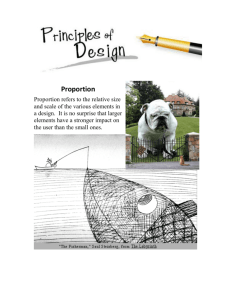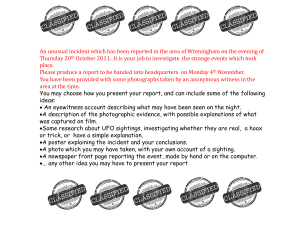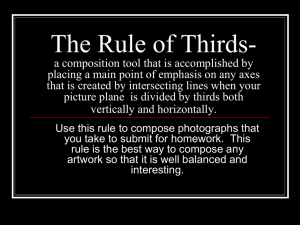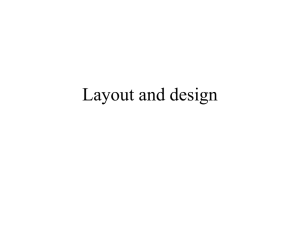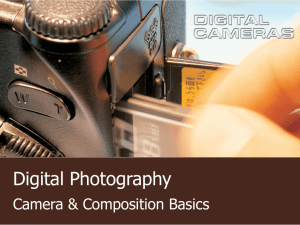Photography Workshop 2 (MS PowerPoint , 5347kb)
advertisement
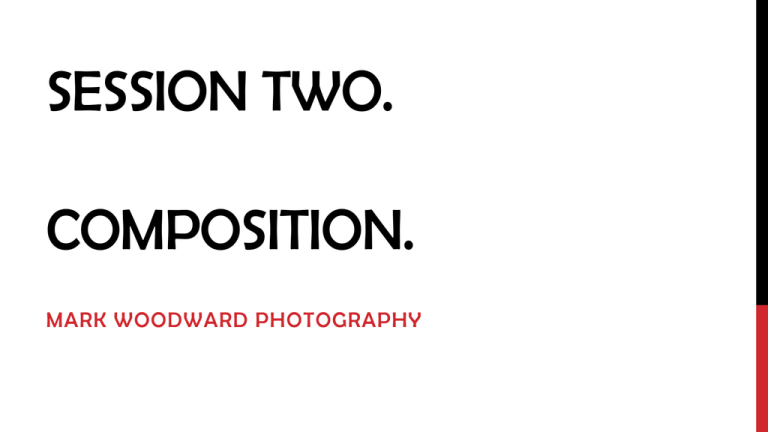
SESSION TWO. COMPOSITION. MARK WOODWARD PHOTOGRAPHY INTRODUCTION – Session two – well done for making it this far! – Homework from last week! – Any ideas why I asked you to go find inspiration online? WORKSHOP PLAN! – Introduction to composition – Aspect. – Composition ‘rules’ and when to use them. – Perspective. – Photo critique technique. – Homework! FIRSTLY… – Join the “James College Photography Tutorial Group” on facebook! – Platform to share photos weekly, post your homework, receive feedback on your images. – http://www.york.ac.uk/colleges/james/photography/ – My contact details are: contact@markwoodwardphoto.com, on facebook at www.facebook.com/markwphoto and @markw_photo on twitter. COMPOSITION – Good composition is about everything in the frame – where should it be? – It can mean the difference between a good and a bad photo. – What’s bad about this? COMPOSITION – Composition is defined as: The organisation and placement of visual elements of a photo. – But it can be more than this: perspective and aspect are equally important. (Some would argue they’re part of composition) – Aspect: the ratio of the length of the sides. 4:3, 16:9, 1:1 are common. THE RULE OF THIRDS – Rule of thirds is a very popular composition ‘rule’. – Essentially, everything in the image should be on a line or crossover between two lines. IN LANDSCAPES: – Split the horizon and land/foreground into thirds: either two thirds sky and one third foreground, or the other way around. – Look for important features, the setting sun, vertical or horizontal lines and apply the rule to them. YOUR BEST COMPOSITION TOOL: CROP – Can totally change a photo – if you can, use it to: – – – – Remove distracting things Make sure horizontal lines are horizontal Change the aspect of a photo – what crop suits the rules? Portrait or landscape? COMPOSITION TECHNIQUES – 1 – Simplify. – Keeping things basic creates dynamic images. – 3 elements to a frame. COMPOSITION TECHNIQUES – 1 COMPOSITION TECHNIQUES – 2 – Fill. – – – – Empty space can work well, but can also work badly! Think about your zoom. Subject size. Think: what is the subject? COMPOSITION TECHNIQUES – 3 – Avoid the middle. – Rule of thirds – SOMETIMES. – Look at ‘image balance’ – Give the picture ‘space’ COMPOSITION TECHNIQUES – 4 – Leading lines. – – – – Fences, roads/road markings, hedges, rivers….. Lead towards the subject Come in at angles Pointing the eye COMPOSITION TECHNIQUES – 5 – Diagonals. – Use them to introduce drama – horizontal and vertical lines often make a picture look ‘calm’. – They’re essentially leading lines.. – …but with the subject diagonal. – The ‘Dutch angle’ can work well.. COMPOSITION TECHNIQUES – 5 – Dutch angle. – Intentionallly strange perspective to make an image more dramatic! – There’s a time and a place. COMPOSITION TECHNIQUES – 6 – Space. – Give subject the space they need to move – as if the motion were to continue. – Can really change the look. – Which way people are facing. COMPOSITION TECHNIQUES – 7 – Backgrounds. – Two ways to get rid of backgrounds: zoom in and fast aperture. – Shallow depth of field = blurry backgrounds – Zoom in = crop out background – Longer focal length = shallower – depth of field. COMPOSITION TECHNIQUES – 8 – Contrast. – Add interest by using contrasting colours or features. That then becomes the subject. – Look for opposite colours. – Break the other rules! COMPOSITION TECHNIQUES – 9 – Ignore the rules! – – – – – Sometimes images work because they don’t follow any rules. More likely to find an image works because it obeys the rules rather than because it breaks them… COMPOSITION TECHNIQUES ROUNDUP – 1 . Simplify. – 2. Fill. – 3. Avoid the middle. – 4. Leading lines. – 5. Diagonals. – 6. Space. – 7. Backgrounds. – 8. Contrast. – 9. Ignore all these… – There’s no reason to include any of them in your photos, you can make great images without.. – …but if you think about one or more of them when you’re taking a shot, it’s more likely to be one you’ll keep. PERSPECTIVE – A very powerful tool for making interesting photos instead of boring ones. – Shoot low and high – don’t just take images at eye height. – Live-view can be a great advantage, as can tilting screens. FORCED PERSPECTIVE – ‘Forced perspective’ is using the perspective of the photo to create interesting images. – Takes creativity to imagine them but again, find inspiration online! HAVING SAID ALL THAT… – Rules are not rules, they’re ‘rules’. – As composition technique number 9 states.. Great images can be made by breaking the rules and throwing it all out the window. – Perfect example: reflections work – really well in halves, not thirds. QUICK PHOTO BREAK/COMPETITION – Go take two photos of something. – One, as if you were going to do it as you would normally – Two, the same subject, but obeying the rule of thirds! PHOTO CRITIQUE TECHNIQUE – Post some images to the facebook group, get some feedback! – Post one, go comment on two. – Three steps: – Look at the photo for at least 10 seconds, look at everything individually as well as a whole. – What do you like and dislike about the photo and why: – Technically (lighting, colour, focus, etc) – Visually (interesting subject, strong feelings, composition) – Suggest one improvement (different crop, brighter) PHOTO CRITIQUE EXAMPLE THANKS FOR LISTENING. – Homework! – Take 3 photos that obey at least one of the compositional ‘rules’ (it can be number 9 if you want..) – Post them on facebook for others to rip them apart! – Comment on other peoples images using the style mentioned previously. – Any questions?
